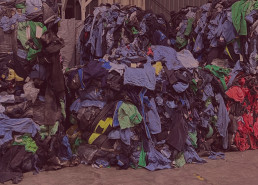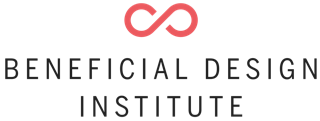Closing the Loop in the Textile Economy: Value Creation in Brandenburg
Joint Press Release by Fraunhofer IAP and Beneficial Design Institute / October 13, 2025
How can the state of Brandenburg benefit from a circular textile industry? This question is addressed in the new policy paper "Closing the loop in the textile industry: Value creation in the state of Brandenburg." Based on the „TexPHB“ feasibility study funded by the Brandenburg Ministry of Climate Protection, it shows how textile waste can be integrated into new value chains.
The textile industry is one of the most resource-intensive sectors and generates significant amounts of waste and emissions. In 2020 alone, approximately 6.95 million tonnes of textile waste were generated in the EU. Worldwide, 92 million tonnes of textile waste end up in landfills in the Global South or in incinerators every year. Mixed polyester-containing waste from fast fashion, workwear or industrial cleaning textiles in the lowest waste category is among the most difficult residual materials to recycle. The EU's Circular Economy Strategy therefore promotes circular processes in the textile sector.
From Feasibility Study to Policy Recommendation
In a joint feasibility study, the Fraunhofer Institute for Applied Polymer Research IAP at Potsdam Science Park, Beneficial Design Institute GmbH and matterr GmbH (formerly RITTEC 8.0 Umwelttechnik GmbH) investigated how polyester-containing waste textiles can be converted into the bioplastic polyhydroxybutyrate (PHB).
"With our innovative matterr process, we recover the monomers terephthalic acid (TA) and ethylene glycol (EG) in virgin quality from polyester-containing textile waste – suitable for the production of new polyester," explains Dr. Tim Seedorf, Head of Research & Innovation at matterr GmbH. "We have also shown that the ethylene glycol obtained can be converted into the biopolymer PHB with the help of bacteria," adds Dr. Maren Wandrey, biochemist at Fraunhofer IAP. An analysis by the Beneficial Design Institute further shows that establishing a textile hub in Brandenburg can make a significant contribution to strengthening the regional circular economy through the sustainable use of textile waste and the establishment of new value chains.
The policy paper translates the consortium's findings into concrete recommendations for political decision-makers in Brandenburg.
PHB: Benefits for Economy, Society, and the Environment
PHB zählt zu den Biokunststoffen, die vollständig biologisch abbaubar, resorbierbar und biokompatibel sind. Prof. Friederike von Wedel-Parlow vom Beneficial Design Institute betont: »PHB vereint ökologische Vorteile mit wirtschaftlichem Potenzial in neuen Märkten. Unsere Untersuchungen haben deutlich gemacht, dass Design Wissenschaft und Industrie gemeinsam Lösungen entwickeln können, die diese Vorteile für Gesellschaft und Wirtschaft nutzbar und Ecodesign-Denken zu einem Erfolg, auch für Brandenburg, machen.«
The bioplastic has a wide range of applications, especially where materials remain in the environment permanently – for example, in water, soil or the human body. Examples include geotextiles for erosion control, artificial shoreline reinforcement, tree and branch protectors, or medical products such as suture material.
Action options for a circular textile economy
The policy paper recommends a multi-stage action plan to lay the foundation for a circular textile economy in Brandenburg. It comprises six key recommendations. Clima State Secretary Dr. Haase explains: "The goal is to retain value creation in the region, establish qualified jobs and position Brandenburg as a model region for this EU initiative. The project consortium's policy paper and the preliminary study results contribute to bringing together ecological sustainability and economic strength in Brandenburg."
The results also have supra-regional significance with potential for close cooperation between Brandenburg and partners in Poland and the Netherlands. Through these collaborations, the state can strengthen its position as a pioneer in the circular economy and build European value chains that incorporate design-driven added value.

Key Recommendations from the Policy Paper
- Support for business start-ups and regional textile biorefineries to enhance resource efficiency
- Funding programs for R&D on innovative textile waste recycling technologies
- Establishment of a competence cluster for data-driven textile circularity
- Promotion of digital data collection along the entire textile value chain
- Qualification of companies for the upcoming Ecodesign Directive 2026
- Integration of local companies into European value chains under the EU “Regional Innovation Valleys for Circular Economy” initiative
Please fill in your email address to download the document.
Project Initiators
Beneficial Design Institute GmbH
We are a design research institute specialising in eco-design and sustainability, based in the Berlin-Brandenburg metropolitan region. We develop holistic innovation concepts and circular product solutions for the textile and fashion industry, usually with design at the beginning of the textile chain. As the driving force behind the ‘TexPHB’ feasibility study and project developer of the regional initiative ‘Nature of Fashion_Design for Transformation’, we start at the end for the first time and combine design, material and circular economy expertise with practical implementation – from research to market readiness. The aim is to regeneratively transform the industry through biocompatible materials, new value creation paths and consistently nature-inspired design.
„Nature of Fashion_Design for Transformation“ is a global initiative led by the Biomimicry Institute and funded by the Laudes Foundation, with regional projects in Berlin-Brandenburg, the Netherlands, and the Global South (Accra, Ghana). The initiative aims to rethink how textile waste is managed through biological and biotechnological innovation. Instead of a linear “Take-Make-Waste” model, it follows a circular “Break Down to Build Up” principle. Its focus is on transforming mixed, low-value textile waste into valuable, biocompatible materials suitable for industrial use across multiple sectors and safely reintegrated into natural cycles. The initiative seeks to raise awareness for regenerative, nature-inspired alternatives within the global fashion system.

